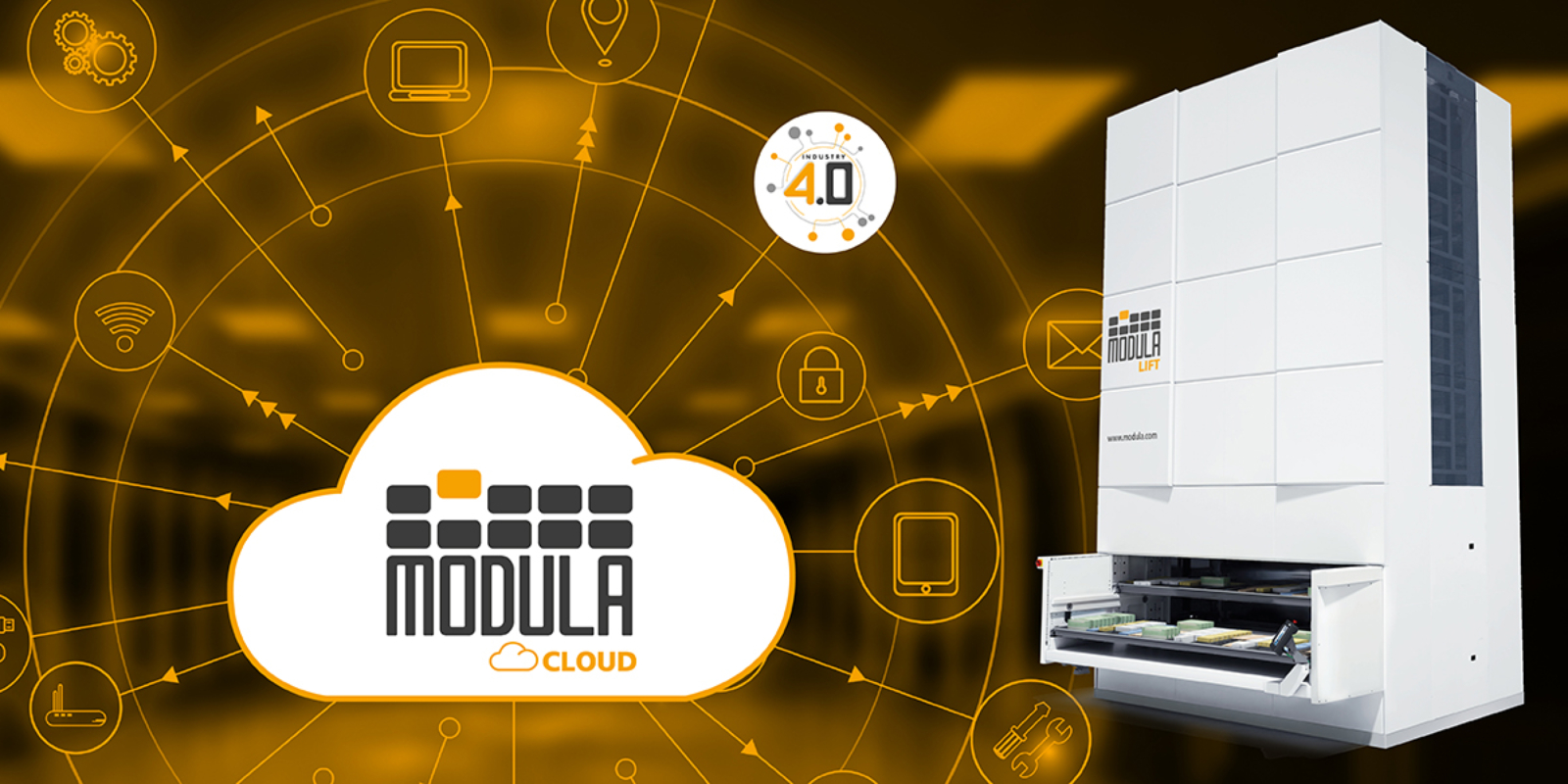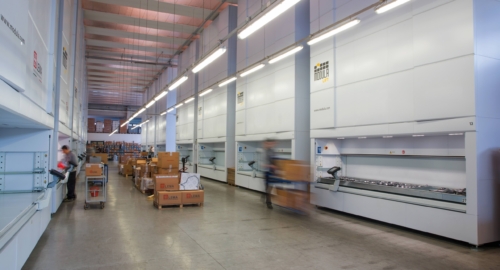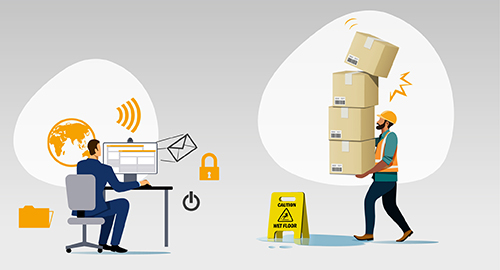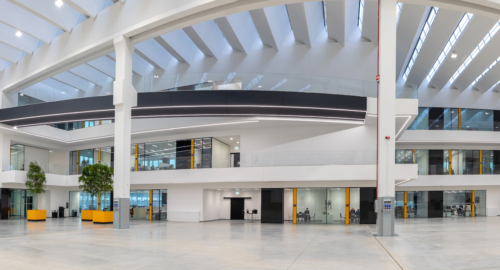The purchase and installation of automated storage technologies and solutions is a delicate step for every logistics and warehouse manager.
The introduction of new machinery at work is often cause for concern, mainly related to the risk of downtime and to not receiving adequate technical support when needed.
The software implementation aspect should not be underestimated either. In this case, a question arises: how will the integration take place? Who will be the main point of contact, the supplier or the consultant? Will people manage to learn all the new processes and workflows properly?
These questions are all reasonable and understandable; behind every kind of technology and automation, there is always a combination of hardware and software that must be organised and handled in the best possible way. By default, these components require different forms of maintenance and support, which must be carefully evaluated and understood before purchasing a new technology.
Which support service should you go for?
When introducing new technology into the supply chain, technical support becomes a critical concern. It’s not just about fixing technical issues, it’s also providing ongoing training, software and hardware updates, and ensuring that the entire system runs smoothly.
In logistics and warehousing, when purchasing a new automated machine such as a vertical lift module, it’s essential to provide adequate technical support, for both the hardware and software. Typically, suppliers can offer this assistance via a range of channels and methods:
- Phone support: the first line of help in resolving immediate issues.
- Remote assistance: using tools such as TeamViewer for technicians to intervene with no need to be there in person.
- On-site assistance: when a technician is needed in person to resolve issues that cannot be fixed remotely. For example, the Modula fast service comes into action (in many Italian provinces) with an on-site intervention within eight hours, bearing in mind the distance from their base.
Importantly, this type of service is personalised on a local level: we offer different packages and proposals depending on the location and branch, to meet our clients’ specific requirements as best we can.
At Modula, we deal with about 80% of issues over the phone. However, for more complex cases, we have specialist technicians ready to intervene directly on site.
Especially for companies that remain operational 24/7 and cannot afford machine downtime, more extensive support becomes vital. At Modula, for example, this type of service includes:
- Support outside working hours: normal business hours don’t always fit in with the operational needs of all businesses, especially those working shifts or continuously.
- Fast-track options: some suppliers offer access to fast lanes for technical support. At Modula, we use the VIP recall service, which guarantees telephone feedback within 30 minutes of a report.
All these support and assistance options, however, are based on the expertise of the technicians and employees dealing with them: the training of specialist technicians and their continuing professional development are key factors to consider when choosing a supplier and its products.
As well as conventional training in the use of Modula products, we offer the opportunity to explore numerous topics in dedicated courses – for technicians, IT specialists and logistics operators – to learn how to use the WMS and various advanced functions. At Modula, we also offer ad-hoc courses to find out more about the electromechanical aspects of our solutions.
However, the specificity of training can always be improved over time, including in terms of requiring support to train new people and provide them with advanced skills to ensure that the company can always count on highly qualified staff.
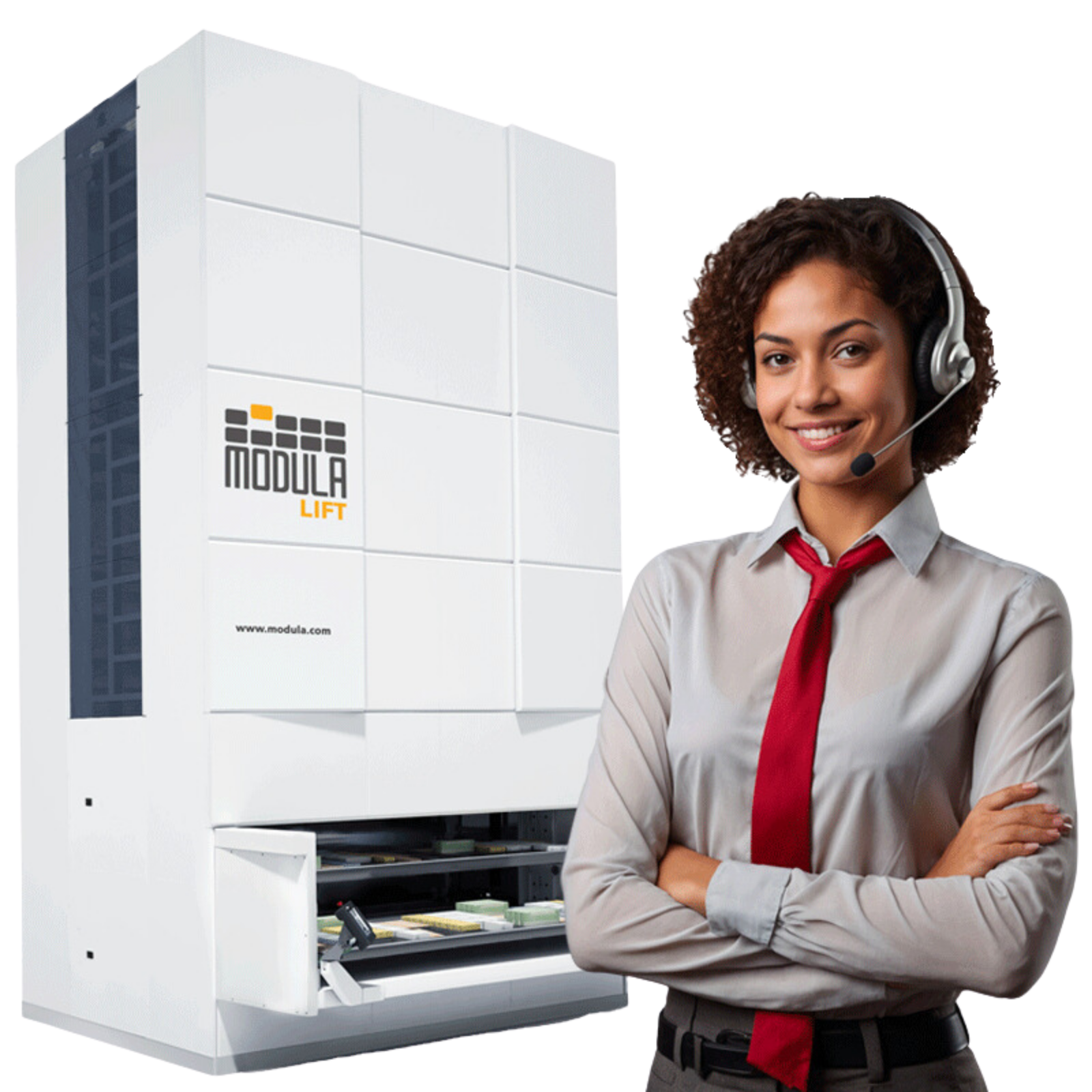
Want to find out more about Modula client services?
See how our specialist technicians work with companies at every stage of the warehouse optimisation process.
Machine maintenance and spare parts
In the logistics and automation industry, regular maintenance and provision of spare parts are essential aspects in ensuring the operational efficiency and durability of equipment. A well-structured maintenance schedule avoids costly downtime and ensures that systems run optimally.
Regular checks, based on usage cycles or time intervals, make it possible to:
- Verify functionality: regularly checking the system is intact and operational, including all mechanical and electronic components.
- Identify malfunctions early: detecting any issues in advance ensures action can be taken promptly, before they become serious. Early detection offers the opportunity to schedule preventive maintenance, to reduce the risk of unexpected faults.
- Optimise handling of spare parts: a well-managed inventory of spare parts is crucial. This includes not only the availability of critical components, but also the effective management of their procurement, ensuring that the necessary parts are always available when needed.
Importance of customised maintenance packages
Every manufacturing facility or warehouse has unique needs, determined by variables such as the type of technology used, the intensity of use and the specific environmental conditions. Offering customised maintenance packages makes it possible to tailor technical support services to each client’s specific features, transforming maintenance from a mere obligation to a strategic advantage, by maximising efficiency and extending machine life.
In these cases, courtesy of the customisation we offer at Modula, both preventive checks and consulting services and software upgrades can be included.
Optimising maintenance of automated solutions, using predictive maintenance
One of the most promising developments in this field is predictive maintenance. This approach offers the opportunity to monitor and manage your machines and systems remotely, preventing malfunctions before they occur. In Modula warehouses, all units can be integrated into a Modula Cloud platform, providing remote control of machine cycles, saturation, picking, efficiencies, inventory and issues that have occurred over time. This 360° view of warehouses, accessible from tablets, PCs or mobile devices connected to the internet, optimises the machine fleet and the overall logistics flow by creating dashboards, reports and statistics.
Strategic management of automated storage solutions
When purchasing a machine, it is essential to consider its dynamism and adaptability to different business needs. By default, Modula’s automated storage solutions are not static; they offer the option of easy modification or relocation thanks to their modular structure, which can reach up to 16 metres in height, providing a business with unparalleled scalability.
Given that many business environments are constantly and rapidly evolving, it is crucial to be prepared to handle unforeseen events and changes, such as the integration of new systems or significant hardware improvements. Modula solutions can be moved or relocated but can also be modified in terms of their trays, quantities, options, partitions and dividers. Units can also be multiplied by adding more and fitting them together to optimise space.
The modular approach facilitates all these changes, offering the option of quick and flexible adaptations to business needs.
Essential factors include thinking proactively about management and maintenance of automations, as well as leveraging tools such as predictive maintenance and remote monitoring: this approach increases both productivity and business resilience.
Training: before, during and after adoption of automated storage technologies
In conclusion, adopting automated storage technologies requires a significant change in mindset compared to managing a manual warehouse. Operators, often accustomed to manual picking, need to acquire new skills to effectively use machinery and automated solutions. Fortunately, the learning process we have designed at Modula is quick and intuitive.
Training to use Modula solutions is split into stages and is surprisingly fast: in a few hours, a specialist technician can teach operators how to use tools such as Copilot and how to pick SKUs in a bay. Once acquired, this knowledge becomes a valuable business asset that can easily be conveyed from one operator to another. Not only does this approach reduce downtime; it also facilitates a smooth transition to the new system.
Behind every advanced technology like Modula’s, there is both an efficient system and a world of services designed to ensure operational effectiveness. Choosing a supplier with a consolidated and widespread presence is essential to ensure that the company performs at its best, with no issues of continuity in productivity. A reliable partner offers not only the technical support required, but also ongoing training and strategic advice to maximise the value of your technology investment.
Want to know more?

